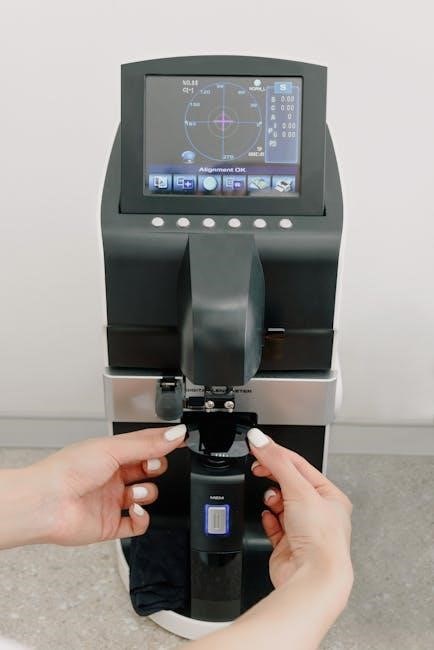M.S. Aphasia Screening Test PDF: An Overview
The M.S. Aphasia Screening Test (MAST) is a brief, repeatable measure designed to identify communication impairments. It aids in early detection, crucial for effective treatment and improving the patient’s quality of life following neurological events.
Aphasia, a language disorder impacting communication abilities, often results from stroke, brain injury, or neurological conditions. Aphasia screening plays a vital role in swiftly identifying individuals who may exhibit language deficits. These screening tools, like the Mississippi Aphasia Screening Test (MAST), are designed to be brief and easily administered by healthcare professionals;
The primary goal of aphasia screening is to detect potential language impairments early, enabling timely referral for comprehensive assessment and intervention. Early detection allows for prompt initiation of speech therapy and other rehabilitative strategies, maximizing the potential for language recovery and improving the patient’s overall quality of life. Effective screening is essential in various clinical settings, including hospitals, rehabilitation centers, and outpatient clinics, ensuring that individuals with aphasia receive the necessary support and care.
Importance of Early Aphasia Detection
Early detection of aphasia is paramount due to its significant impact on a patient’s life. Aphasia affects communication, hindering social interaction, emotional expression, and the ability to perform daily tasks. Identifying aphasia early allows for the implementation of timely interventions, such as speech therapy, which can improve language skills and overall communication abilities.
Moreover, early detection facilitates better prognostication and treatment planning, leading to more effective rehabilitation outcomes. Early intervention can mitigate the long-term consequences of aphasia, reducing frustration, isolation, and the burden on caregivers. By recognizing aphasia promptly, healthcare professionals can provide appropriate support, education, and resources to patients and their families, empowering them to navigate the challenges associated with this condition and improving their quality of life. Early diagnosis will lead to better patient management.
The Need for Efficient Screening Procedures
Efficient screening procedures are crucial in healthcare settings to ensure timely identification of aphasia among individuals. Aphasia, a language disorder often resulting from stroke or brain injury, significantly impacts communication abilities. Without efficient screening, many cases of aphasia may go unnoticed, leading to delayed intervention and poorer outcomes. Efficient screening procedures enable healthcare professionals to quickly assess language skills, distinguishing between individuals who require further evaluation and those who do not.
This streamlined approach saves valuable time and resources, preventing unnecessary referrals and enabling prompt allocation of appropriate care. Moreover, efficient screening procedures facilitate early intervention, which has been shown to improve language recovery and enhance the overall quality of life for individuals with aphasia. By implementing efficient screening protocols, healthcare systems can ensure that all patients with aphasia receive the timely support and treatment they need to maximize their communication potential.

The Mississippi Aphasia Screening Test (MAST)
The Mississippi Aphasia Screening Test (MAST) is a widely used tool for identifying aphasia. It provides a quick and reliable screening, aiding healthcare professionals in diagnosing and monitoring aphasia effectively.
Development and Purpose of the MAST
The Mississippi Aphasia Screening Test (MAST) emerged as a concise, repeatable screening tool for individuals facing severely impaired communication skills. Its creation stemmed from the collaborative efforts of neuropsychologists, physicians, and speech-language pathologists, aiming to address the critical need for rapid aphasia detection.
The MAST’s primary purpose is to offer a swift and dependable method for identifying language deficits, particularly beneficial for individuals who might find lengthy testing sessions overwhelming. It was conceived as a bedside or clinic-based assessment, accessible to various healthcare providers, ensuring timely evaluation across diverse neurological conditions. Its utility extends to monitoring language changes, making it invaluable in managing conditions like stroke, traumatic brain injury, and dementia, where language abilities may fluctuate over time.
Administration and Scoring of the MAST
The Mississippi Aphasia Screening Test (MAST) is designed for ease of administration, typically taking only 5 to 15 minutes to complete. It can be administered verbally, making it accessible for patients with varying levels of physical ability. Healthcare professionals with minimal specific training in aphasia testing can effectively administer the MAST.
The MAST evaluates several language domains, and scoring is based on a point system. Specific tasks include object naming, sentence repetition, and following instructions. Points are awarded for correct responses, and the total score indicates the severity of aphasia. Clear scoring guidelines are provided to ensure consistent and reliable interpretation of results. The brevity and straightforward scoring method make the MAST a practical tool for routine clinical use.
MAST as a Brief and Repeatable Measure
The Mississippi Aphasia Screening Test (MAST) distinguishes itself through its brevity, typically requiring only 5-15 minutes for administration. This efficiency is particularly advantageous for individuals with severe language impairments who may experience frustration or fatigue during lengthy assessments.
Furthermore, the MAST is designed as a repeatable measure, enabling clinicians to monitor changes in language abilities over time. This feature is crucial in tracking progress during rehabilitation or detecting declines in language function associated with progressive neurological conditions. Its repeatability makes it ideal for serial assessments at bedside or clinic appointments by healthcare providers. The MAST’s brevity and repeatability contribute to its utility in diverse clinical settings.

Key Features and Components of the MAST
The MAST comprehensively assesses both expressive and receptive language abilities, key indicators of aphasia. It includes subscales evaluating various language domains, providing a detailed profile of an individual’s communication strengths and weaknesses after a neurological event.
Assessment of Expressive and Receptive Language Abilities
The Mississippi Aphasia Screening Test (MAST) is specifically designed to evaluate both expressive and receptive language skills, which are often impaired in individuals with aphasia. Expressive language abilities, such as naming objects, repeating sentences, and generating words, are assessed to determine the patient’s capacity to communicate verbally. The test includes tasks that require the individual to produce language, revealing any difficulties in word retrieval, grammar, or articulation. These tasks help clinicians understand the extent to which a patient can effectively convey their thoughts and ideas.
In addition to expressive language, the MAST also examines receptive language skills, focusing on the ability to understand spoken language. This involves tasks like following instructions, answering yes/no questions, and comprehending simple commands. By assessing receptive language, the MAST helps identify difficulties in auditory processing and comprehension, critical for daily communication. The comprehensive assessment of both expressive and receptive language abilities ensures a thorough understanding of the individual’s communication profile.
Subscales and Domains Evaluated by the MAST
The Mississippi Aphasia Screening Test (MAST) comprises several subscales designed to evaluate different domains of language and communication. These subscales provide a comprehensive assessment of various linguistic abilities affected by aphasia. The MAST typically includes subtests that assess areas such as naming, repetition, comprehension, and word generation. Naming tasks require the individual to identify objects or pictures, assessing word retrieval skills. Repetition tasks evaluate the ability to accurately repeat words and sentences, reflecting phonological processing and motor speech control.
Comprehension is assessed through tasks that involve following commands and answering questions, revealing the ability to understand spoken language. Word generation tasks, such as picture description, assess expressive language abilities and fluency. By evaluating these specific subscales, the MAST provides a detailed profile of language strengths and weaknesses, aiding in targeted intervention planning and monitoring of progress. The MAST is a valuable tool for healthcare professionals.
Reading Instructions in MS Aphasia Screening Test
The Mississippi Aphasia Screening Test (MAST) includes a reading component that assesses the individual’s ability to understand and follow written instructions. This section typically involves a series of commands that the examinee must read silently and then perform. For example, the instructions might include simple actions like “Open your mouth” or “Make a fist,” which the individual is expected to execute upon reading.
The purpose of this subtest is to evaluate reading comprehension and the ability to translate written language into physical actions. The scoring considers both the accuracy of the action performed and whether the individual follows the instructions independently. The reading section helps to differentiate between language deficits affecting comprehension and those primarily affecting expressive abilities. It is an integral part of the MAST, providing valuable insights into the patient’s overall communication skills and cognitive functioning.

Validation and Adaptation of the MAST
The MAST has undergone validation in multiple languages, including Estonian and Persian, demonstrating its effectiveness across diverse populations; Clinical studies support its reliability as a screening tool for identifying aphasia and monitoring language changes.
MAST in Different Languages and Populations
The Mississippi Aphasia Screening Test (MAST) has been adapted and validated for use in various languages and populations, enhancing its global applicability. The Estonian version (MASTest) demonstrates its utility even within smaller language communities. Adapting the MAST for diverse linguistic and cultural contexts ensures accurate aphasia screening across different populations. Validation studies confirm its effectiveness in identifying language impairments, regardless of language background.
The Persian version of the MAST (MASTp) further exemplifies its adaptation to different languages. These adaptations involve linguistic and cultural adjustments to maintain the test’s validity and reliability. By adapting the MAST, healthcare professionals can effectively screen for aphasia in individuals from diverse backgrounds, improving early detection. This leads to timely interventions and better outcomes for patients with language impairments.
Clinical Validation Studies of the MAST
Clinical validation studies of the Mississippi Aphasia Screening Test (MAST) have established its reliability and validity in identifying aphasia. These studies confirm the MAST’s effectiveness as a screening tool for language impairments. Research supports its use in various neurological conditions, including stroke and traumatic brain injury. The MAST’s ability to accurately detect aphasia has been demonstrated through rigorous testing and comparison with comprehensive language assessments.
Validation studies often involve adapting the MAST for specific populations, ensuring its cultural and linguistic appropriateness. Such studies assess the MAST’s sensitivity and specificity, crucial for minimizing false positives and negatives. The results of these validation studies highlight the MAST’s value as a quick and reliable tool for healthcare professionals. Its use contributes to early diagnosis and intervention, ultimately improving patient outcomes.

Applications and Utility of the MAST
The MAST is utilized across neurological conditions for monitoring language changes. It provides a repeatable, brief screening, valuable in diverse healthcare settings. Its applications extend to detecting aphasia and guiding treatment strategies.
Use in Various Neurological Conditions
The Mississippi Aphasia Screening Test (MAST) demonstrates versatility through its application across a spectrum of neurological conditions. It’s not solely confined to post-stroke assessments but extends to the evaluation of language abilities in individuals affected by dementia, encephalopathies, and traumatic brain injuries.
Its utility is also noted in cases involving tumors, reflecting its capacity to screen language impairments irrespective of the underlying neurological cause. The MAST’s adaptability makes it a valuable asset in various clinical settings, providing healthcare professionals with a consistent tool for initial aphasia detection.
This broad applicability underscores the MAST’s importance in facilitating early intervention and support for patients experiencing language deficits due to diverse neurological etiologies. Its use aids in appropriate management and rehabilitation planning.
Monitoring Language Changes Over Time
The Mississippi Aphasia Screening Test (MAST) is designed for serial assessments, enabling healthcare providers to monitor language ability changes in patients over time. This repeatable nature is crucial for tracking the progression or recovery of language skills following neurological events like stroke or traumatic brain injury.
By administering the MAST at regular intervals, clinicians can observe subtle shifts in expressive and receptive language abilities. This facilitates timely adjustments to treatment plans and rehabilitation strategies, optimizing patient outcomes. The MAST’s sensitivity to change makes it a valuable tool for evaluating the effectiveness of interventions and guiding long-term management.
Moreover, monitoring language changes can aid in identifying potential declines or improvements, informing decisions regarding continued therapy or adaptive strategies to support communication. This longitudinal perspective is essential for providing patient-centered care and maximizing functional independence.
